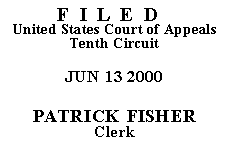

| JOHN GREGORY LAMBROS,
v.
J.W. BOOKER; U.S. BOARD OF
PAROLE, U.S. Parole Commission |
|
Before BRORBY, KELLY, and
MURPHY, Circuit Judges.
After examining the briefs and appellate record, this panel has determined
unanimously that oral argument would not materially assist the determination of
this appeal. See Fed. R. App. P. 34(a)(2); 10th Cir. R. 34.1(G). The case is
therefore ordered submitted without oral argument.
Appellant John Gregory Lambros, a federal inmate appearing pro se, appeals the district court's decision on his motion to alter and amend the judgment dismissing his petition for a writ of habeas corpus filed pursuant to 28 U.S.C. § 2241. We affirm.
Mr. Lambros initiated this action by filing a § 2241 petition, in which he alleged government officials lacked jurisdiction or authority to extradite him from Brazil on a parole violation warrant. The district court dismissed the petition, concluding Mr. Lambros unsuccessfully raised the same issue concerning the validity of his extradition in an earlier § 2241 petition, which the district court denied.
Following the district court's order denying his § 2241 petition, Mr. Lambros filed a motion to alter or amend the order on grounds his petition did not constitute a successive petition because the earlier habeas action centered on whether he could appeal the parole commission's decision, and not on setting aside the parole violation warrant. In ruling on Mr. Lambros' motion, the district court determined the abuse-of-the-writ doctrine prohibited consideration of Mr. Lambros' extradition claim because he failed to raise it, and therefore, defaulted it, in the first federal habeas proceeding. As a result, the district court held that "[t]o the extent [Mr. Lambros'] distinction between his two habeas actions points more to dismissal of the instant petition as an abuse of the writ rather than as a successive petition, dismissal of the petition remains appropriate." The district court then granted Mr. Lambros' motion to alter and amend the judgment "to include discussion of the dismissal of the petition as an abuse of the writ, [and] no other modification to the court's decision to dismiss the petition is warranted." In other words, the district court effectively dismissed Mr. Lambros' § 2241 petition for abuse of writ, rather than for filing a successive writ.
Mr. Lambros now appeals the district court's decision concerning its disposition of his motion, and in essence, is appealing the court's decision denying his second § 2241 petition as an abusive writ under § 2244(a). We review de novo the district court's legal conclusions in dismissing a § 2241 habeas petition. Patterson v. Knowles, 162 F.3d 574, 575 (10th Cir. 1998). We have held a second or subsequent § 2241 petition which raises a new claim, which could have been raised in an earlier petition, should be dismissed as abusive under § 2244(a), absent a showing of either cause and prejudice or a fundamental miscarriage of justice. George v. Perrill, 62 F.3d 333, 334-35 (10th Cir. 1995).(1)
This showing is required of pro se petitioners like Mr. Lambros, just as it is required of those represented by counsel. Id. at 335 (quoting Rodriguez v. Maynard, 948 F.2d 684, 687 (10th Cir. 1991)).
Applying these principles, our inquiry into the record reveals nothing to show "cause" for Mr. Lambros' failure to raise the extradition issue in his earlier petition nor anything justifying a review of his petition under the "fundamental miscarriage of justice" exception. While Mr. Lambros suggests "cause" exists for omitting the extradition issue in his first petition, his abstract assertions are patently void of facts sufficient to explain his default.(2)
Accordingly, the district court did not err in denying Mr. Lambros' § 2241 petition as an abuse of the writ.
For these reasons, we AFFIRM the district court's March 22, 2000 Order granting Mr. Lambros' motion to alter and amend the district court's May 28, 1998 Order "to include the court's discussion of the dismissal of the petition as an abuse of the writ."
Entered by the Court:
WADE BRORBY
United States Circuit Judge
*. This order and judgment is not binding precedent except under the doctrines of law of the case, res judicata and collateral estoppel. The court generally disfavors the citation of orders and judgments; nevertheless, an order and judgment may be cited under the terms and conditions of 10th Cir. R. 36.3.
1. Section 2244(a) is a gatekeeping provision which states:
No circuit or district judge shall be required to entertain an application for a writ of habeas corpus to inquire into the detention of a person pursuant to a judgment of a court of the United States if it appears that the legality of such detention has been determined by a judge or court of the United States on a prior application for a writ of a habeas corpus, except as provided in section 2255.
28 U.S.C. § 2244(a). While § 2244(a) does not mention the abuse-of-the-writ doctrine, the Supreme Court has determined § 2244(a) applies to abusive writs, including those filed under § 2241. See George, 62 F.3d at 334-35.
2. Mr. Lambros asserts his omission in failing to raise the extradition issue resulted from his "carelessness due to [a lack of legal] education and brain control implants placed within him in Brazil that still control him." In support, Mr. Lambros fancifully theorizes that agents of the United States and Brazilian governments "implanted some sort of electrodes into his body for the purpose of monitoring and controlling his actions via radio telemetry." While Mr. Lambros also discusses the merits of the extradition issue and provides a procedural summary of his litigation, he offers no reasonable explanation for his default.